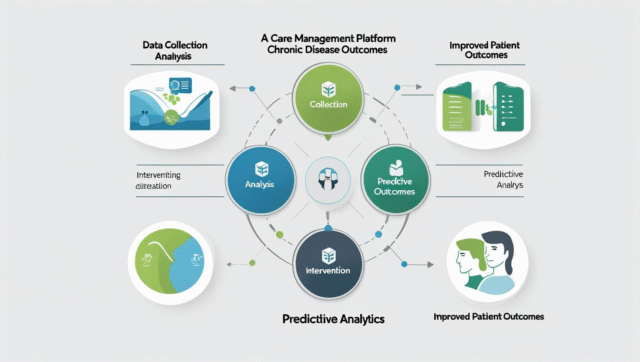Nearly 90% of healthcare costs in the US stem from chronic conditions. Healthcare providers who implement organized care management can better monitor their patients and catch health problems early. Through regular check-ins, proven medical protocols, and treatment plans customized to each patient’s needs, doctors and nurses achieve better results while preventing unnecessary hospital stays. This benefits both patients and medical practices. As healthcare moves toward preventive care and outcome-based payment models, systematic chronic disease management has become fundamental to quality patient care.
Diabetes, COPD, heart failure, and other chronic conditions can no longer be managed with routine examinations. Healthcare teams want more intelligent technologies than manual tracking and reactive therapies due to aging populations and increasing care complexity.
According to the CDC, 4/10 Americans have two or more chronic illnesses, and 6/10 have at least one. These numbers represent patients who require ongoing, coordinated care. Sadly, a lot of conventional models are unable to provide these people with the ongoing, proactive care they require. This gap is filled by predictive analytics combined with state-of-the-art technologies.
The treatment of chronic diseases is rapidly relying on predictive analytics. It gives clinicians the ability to act sooner, intervene more effectively, and lessen the overall pressure on the system when combined with a contemporary Care Management Platform.
What is Care Management?
Care management is a systematic approach to organizing patient care activities and promoting communication between all healthcare providers involved in a patient’s treatment. This ensures that patients with chronic conditions receive comprehensive, continuous, and individualized care that improves their health and quality of life.
What Is Predictive Analytics in Healthcare?
Predictive analytics enables physicians to predict possible outcomes by analyzing both past and current patient data using statistical models and AI. Healthcare professionals can now anticipate and prevent symptoms rather than just responding to them.
How It Works:
- Risk Identification: Ranks patients based on hospitalization likelihood and care gaps.
- Real-Time Alerts: Notifies clinicians when data shows early signs of deterioration.
- Suggested Actions: Delivers proactive guidance embedded in clinical workflows.
This proactive system helps health organizations manage high-risk patients efficiently while avoiding unnecessary complications.
The Impact of Care Management on Chronic Disease Management
1. Better Risk Prioritization
Care managers may concentrate on the patients who need the most attention first, thanks to AI-enhanced tools that automatically classify patients by risk level.
2. Personalized Care Pathways
Predictive tools tailor recommendations for each patient. For instance:
- If a diabetic’s blood glucose levels fluctuate, they may need to review their medication or diet.
- When a patient with heart failure suddenly puts on weight, an emergency intervention may be required.
3. Fewer Readmissions
Care teams can take action before the patient returns to the ER. They do this by recognizing early warning signs like missed appointments, abnormal vitals, or medication gaps.
4. Clinician Efficiency
Staff no longer need to sift through static reports. Instead, they get timely prompts and to-do lists based on dynamic risk scores.
Real Use Cases That Matter
Predictive analytics is already making a real-world impact across several chronic conditions:
- Diabetes: Early alerts on uncontrolled A1C levels
- Heart Failure: Fluid retention warnings based on biometric data
- COPD: Respiratory status tracking tied to environmental triggers
- CKD: Kidney function trends tied to lab monitoring
- Hypertension: Pattern recognition in blood pressure fluctuations
The Evolution of Care Management
Traditional systems were often too static and manual to handle today’s care demands. Over time, care management platforms have matured significantly:
| Generation | Features |
| 1st-Gen | Manual chart reviews, paper-based notes |
| 2nd-Gen | Digital dashboards, siloed data |
| 3rd-Gen | Real-time insights, AI integration, workflow automation |
Today’s most advanced platforms leverage a Digital Health Platform approach that integrates data from EHRs, labs, devices, and social health information into one actionable interface.
Benefits for Healthcare Teams
An intelligent Care Management Solution offers real-time clarity and helps teams act without delay. The benefits include:
- Outreach to patients who are at risk was given priority.
- Automated notifications that lessen mistakes made by humans
- Seamless care coordination between departments
- Comprehensive logs of activities and results
Clinicians and case managers may work more swiftly and confidently with data-driven help.
Data Speaks Louder Than Words
Recent studies show platforms equipped with predictive capabilities:
- Lower hospital readmissions by up to 65%
- Cut administrative workload by nearly 85%
- Reduce overall chronic care costs significantly
These improvements directly support value-based care metrics and patient experience initiatives.
Avoiding Burnout While Improving Outcomes
Managing hundreds of thousands of chronic care patients without automation isn’t sustainable. Smart technology helps by:
- Automating daily patient reviews
- Escalating only the most urgent cases
- Endorsing evidence-based measures
By doing this, tiredness is avoided, and more time is spent on useful clinical interaction rather than manipulating data.
Who Benefits Most?
Patients with ongoing, complex conditions see the greatest improvements when predictive analytics are used to guide care. But the benefits extend across the entire care continuum:
- Patients: Receive more timely and relevant care
- Providers: Make faster decisions with more confidence
- Health Systems: Improve quality metrics and financial sustainability
Building A Scalable Future
The shift to smarter chronic disease care is only just beginning. As health systems face rising demands, the use of AI and analytics will become not just a value-add but a necessity.
With a flexible Digital Health Platform, organizations can:
- Expand from one condition to many
- Scale from one clinic to enterprise-wide use
- Adapt as regulatory and reimbursement models change
Why This Matters Now
Both chronic illnesses and the demands placed on physicians are here to stay. However, those difficulties become manageable with the correct resources.
Healthcare teams may respond more quickly, enhance treatment quality, and cut down on unnecessary expenses by integrating predictive analytics into a strong care management platform.
That’s what real transformation looks like.
Technology Behind the Shift
Data, artificial intelligence, and clinical reasoning must all be integrated into a single engine that powers everyday decisions in a next-generation care management solution. Additionally, that engine needs to be user-friendly, thoroughly integrated, and completely responsive to the demands of patients and clinicians.
About Persivia
One such platform leading this charge is Persivia CareSpace®. It offers more than 200 treatment pathways, more than 9,000 clinical rules, and real AI-driven insights that are integrated right into workflows. It enables healthcare organizations to do more than just react and record; it enables them to anticipate and avoid.
Regardless of the number of patients you are managing, a few hundred or hundreds of thousands, Persivia offers the intelligence required to confidently streamline treatment, cut costs, and enhance results.
Get in touch today!







